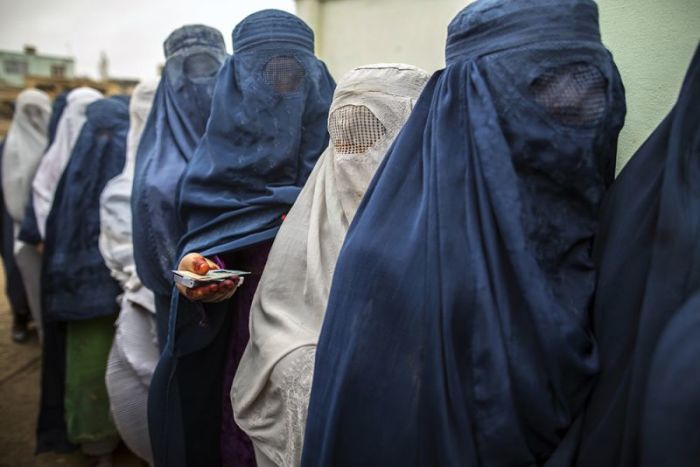Taliban criticized for ordering women to cover faces in public, other restrictive edicts

The Taliban's new decree requiring women to conceal their faces and wear a full-body covering in public has been met with condemnation, particularly from Afghan women facing another restriction on their freedom since the Islamic terrorist group's takeover of Afghanistan.
Taliban Chief Haibatullah Akhunzada issued the latest decree requiring women to cover their faces and bodies in public on Saturday at a function in Kabul, according to reports.
"They should wear a chadori [head-to-toe burqa] as it is traditional and respectful," the Taliban Chief said in the decree.
The Propagation of Virtue and Prevention of Vice ministry announced the new decree on the same day from Akhunzada at a media conference, reports Al Jazeera.
The dress code is only the latest restriction imposed by the Taliban on women over the past few months.
In December, the ministry imposed travel restrictions on women, forbidding them from journeying more than 45 miles without a close male relative.
The reintroduction of dress code requirements resembles the Taliban's previous rule in Afghanistan from 1996 to 2001.
During that time, the regime forced many women to wear burqas. While some women wear headscarves today, most Afghan women living in more urban areas like Kabul do not conceal their faces.
The decree includes punishments for Afghan women's fathers or closest male relatives, who may be fired from their jobs or imprisoned if their female relative does not cover her face outside the home.
"While more than 35 [million] people are on the edge of starvation, the Taliban's only priority seems to be women's clothing," former Afghan Parliament Member Fawzia Koofi wrote in a tweet.
"Women of Afghanistan have always dressed up according to Islamic principles. Burqa is a traditional wear and has always been an individual choice and never compulsory in Islam."
While more than 35m people are on the edge of starvation,Taliban’s only priority seems to be women’s clothing. Women of Afg have always dressed up according to Islamic principles. Burqa is a TRADITIONAL wear & has always been an individual choice and NEVER COMPULSORY in Islam. pic.twitter.com/FtJdnBpPgM
— Fawzia Koofi (@Fawziakoofi77) May 7, 2022
According to The Telegraph, the Taliban may jail male guardians of women who violate the rule for three days. The decree declares women should not leave the house if they do not have any work to do outside the home.
Tamim Asey, executive chairman of the Institute of War and Peace Studies think tank, told the newspaper that the "Taliban have turned Afghanistan into an open air natural prison for women."
As Politico reported Sunday, the Taliban's governing body is heavily divided amid a worsening economic crisis due to the lack of assistance and recognition from Western nations.
In March, Taliban leaders said that Afghan girls should not be allowed to continue their education after completing the sixth grade, claiming that letting older girls attend school violated Islamic principles.
This conflicted with Taliban officials' promises to the media weeks before the school year began that all girls would be permitted to attend school.
Akhunzada reportedly favors stricter requirements for women and girls, including women rarely leaving their homes and marrying at a young age. Some Taliban leaders, however, have ignored harsher edicts on women to avoid undermining the group's efforts to transition into a legitimate governing body accepted by other countries.
"These edicts attempt to erase a whole gender and generation of Afghans who grew up dreaming of a better world," Obaidullah Baheer, a visiting scholar at New York's New School who also served as a former lecturer at the American University in Afghanistan, told Politico.
"It pushes families to leave the country by any means necessary. It also fuels grievances that would eventually spill over into large-scale mobilization against the Taliban."
In September, the United Nations condemned the Taliban for banning demonstrations and using violence against women peacefully protesting against the Taliban assuming leadership of Afghanistan. Taliban fighters beat and detained multiple women and 15 journalists during demonstrations in Kabul.
"As Afghan women and men take to the streets during this time of great uncertainty in their country to press peacefully for their human rights to be respected — including women's right to work, to freedom of movement, to education and political participation — it is crucial that those in power listen to their voices," Ravina Shamdasani, the spokesperson for the U.N. High Commissioner for Human Rights, said in a statement at the time.
The Taliban called the protesting women "agents of America."
"Their government doesn't count us as citizens of this country even though we are half of the population," a protesting woman said in a Wall Street Journal report. "We don't care if they beat us or even shoot us, we want to defend our rights. We will continue our protests even if we get killed."
Following the U.S. military's pull out of Afghanistan last year, critics warned that the Taliban takeover would have dire consequences for the freedom of Afghan women after a "long struggle for basic freedoms and opportunities" after the Taliban's defeat in 2001.




























